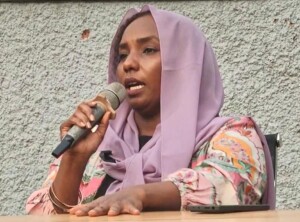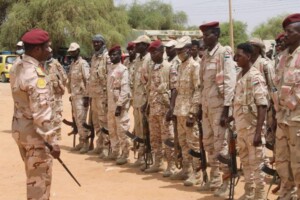Western diplomats urge Sudan to condemn Russian aggression in Ukraine
The ambassadors and diplomats of Western countries in Khartoum have called on the government of Sudan not to follow Russia’s decision to recognise the declaration of independence of the Donbass and Lugansk regions in eastern Ukraine, that are under the control of pro-Russian separatists, and “to condemn the violations of the Russian Federation in clear terms”.
 The Sudanese Naval Forces received a Russian frigate
which docked in Port Sudan in March 2021 (SUNA)
The Sudanese Naval Forces received a Russian frigate
which docked in Port Sudan in March 2021 (SUNA)
The ambassadors and diplomats of Western countries in Khartoum have called on the government of Sudan not to follow Russia’s decision to recognise the declaration of independence of the Donbass and Lugansk regions in eastern Ukraine, that are under the control of pro-Russian separatists, and “to condemn the violations of the Russian Federation in clear terms”.
Ambassador Robert van den Dool, head of the European Union Mission in Sudan, said in statements after a meeting with a delegation of ambassadors and heads of missions of the European Union, the Troika, Canada, and Switzerland, Ambassador Ali El Sadig, the acting Foreign Affairs Minister, said that the ambassadors called on Sudan, during the meeting, to condemn the violations of the Russian Federation in clear terms.
The delegation called on Sudan to join the international community in reasserting Ukraine’s territorial integrity and stressing the need to find a peaceful solution to the conflicts and to hold the perpetrators of violations of international law accountable.
The delegation condemned in the strongest terms the invasion of Ukraine and the provocations of the armed forces of the Russian Federation, and called on Sudan to demand Russia to immediately stop this aggression, which endangers international peace and security on a global scale. The ambassadors informed the Minister-designate of his condemnation of Belarussian involvement in this aggression against Ukraine.
The Sudanese Ministry of Foreign Affairs said in a press circular that the ambassadors of the European Union inquired about Sudan’s position on the Russian attack, as well as the background of the visit of the First Vice-President of the Sovereignty Council and a number of ministers to Russia.
Acting FA Minister Ali El Sadig assured the European Union ambassadors that the visit of the Vice-President of the Sovereignty Council to Moscow was scheduled before the outbreak of the Ukrainian crisis and aims to discuss aspects of bilateral cooperation between the two countries.
On the position on the Ukrainian crisis, he stressed that Sudan calls for stopping the escalation on both sides, resorting to dialogue, and preferring diplomatic methods to reach a solution to the Ukrainian crisis.
Sudanese in Ukraine
The Sudanese community in Ukraine are living in tragic conditions with the continuation of the Russian attack on Ukraine. Osama Ali, a member of the Sudanese community in Ukraine who managed to reach Poland, said that the Sudanese live in the Ukrainian cities and borders in extremely difficult conditions, with the Ukrainian army deploying security barriers in cities and travel routes, pointing to severe overcrowding. A number of them stranded at the borders do not have identification papers. He called on members of the community to use trains on their journey to Poland as the only safe way.
The Vice Chairman of the Sovereignty Council continued his visit to Moscow and his meeting with Russian officials in light of the trend of the international situation to the brink of explosion after the Russian President’s order to put the nuclear deterrent forces on alert.
Hemeti and his accompanying delegation earlier met with the Russian Deputy Prime Minister, Secretary of the Russian Security Council, and Deputy Defence Minister of the Russian Federation.
The Sovereignty Council said in a press release that the meetings ensured the activation of all previous agreements in the economic, diplomatic, political and security fields, and the intensification of aspects of cooperation in various political and military fields, in addition to activating the work of ministerial committees and arranging for their convening as soon as possible.
The European Emergency Committee confirmed that there are no deaths or injuries among the Sudanese in Ukraine, noting that they suffer from severe fatigue as a result of walking long distances due to the conditions of movement and congestion on the roads and borders.
The committee said that dozens of students are still stuck in the cities of Kyiv, Kharkov, Odessa, Poltava, and others. There are about 150 Sudanese students at the border crossings in Ukraine, some of whom do not have travel documents.
She noted the arrival of about 25 Sudanese from Ukraine to Poland and three to Slovakia.
The committee indicated in a statement that most of the Sudanese in Ukraine suffer from a lack of money in their possession due to the restrictions imposed by the Ukrainian authorities on the movement of cash and the suspension of some banking activities.
The committee recommended all students to leave immediately from Kharkov, Kyiv and the eastern cities and head west towards the Polish, Slovak and Romanian borders. It also recommended moving through the Lvov city crossings, despite its overcrowding for security reasons. And taking the train from Lvov to Warsaw, explaining that the Emergency Committee will help the students to arrange their conditions. After entering Poland
The Chargé d’Affaires of the Sudanese Embassy in Kyiv, Ambassador Okasha Mudawi, said that between 40 and 50 per cent of the Sudanese have been evacuated from Ukrainian cities, and an estimated number of them have arrived in Romania and Poland.
He indicated, in press statements, that it is not possible to allocate an air bridge to transport the Sudanese stranded in Ukraine to Sudan or to safe areas, pointing to the difficulty of entering planes due to the closure of the entire airspace, even on the border areas.
The stranded are in dire need of sums of money to travel overland through two crossings designated from Romania and Poland.











 and then
and then